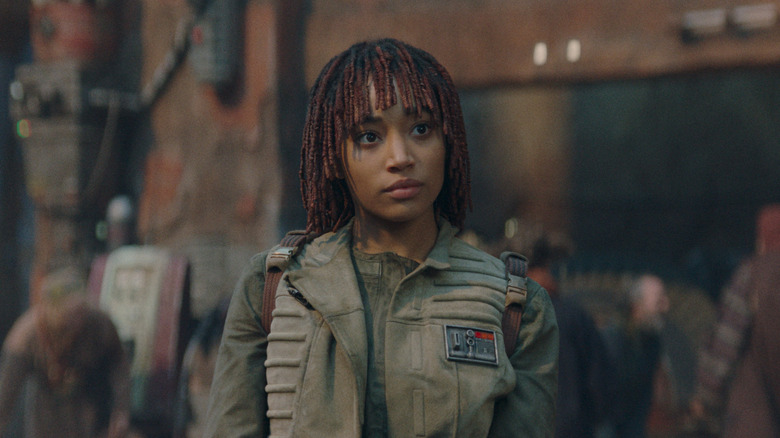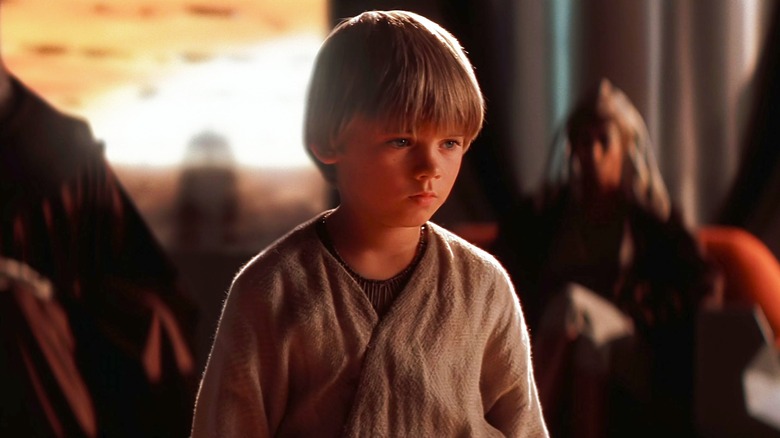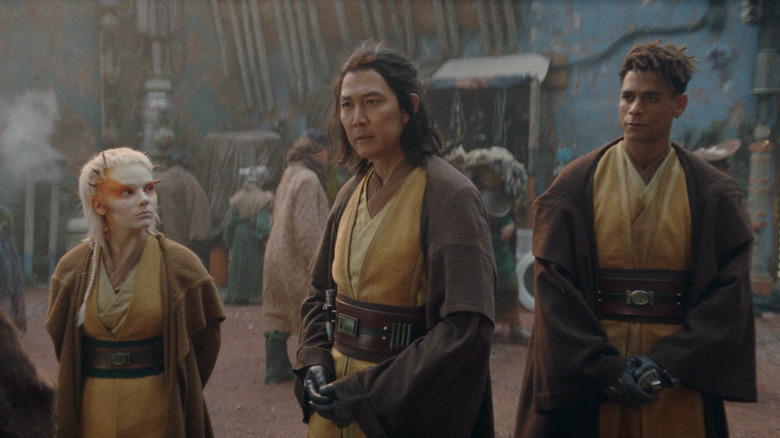The Acolyte Episode 3 Brings Back One Of The Most Hated Things In Star Wars
Contains spoilers for "The Acolyte" Episode 3
Ever since taking over the Star Wars franchise, Disney has been hesitant — terrified, one might say — to mention midi-chlorians. Described by Qui-Gon Jinn (Liam Neeson) in "Star Wars: Episode I — The Phantom Menace" as "a microscopic life form that resides within all living cells," midi-chlorians changed fans' understanding of the Force when the prequel trilogy began. In the original trilogy, the Force is essentially a magical well of power — something vague and immeasurable. And if you were a Star Wars fan when the prequels were coming out, you certainly remember how aggressively many fans hated George Lucas' new "scientific" explanation.
Alongside Jar Jar Binks (Ahmed Best), midi-chlorians became a rallying cry for those who believed "The Phantom Menace" ruined Star Wars. You could argue that the introduction of a more mechanical explanation for the Force doesn't really change anything, but prequel rage was burning hot at the turn of the millennium, and "fans" needed fuel for the fire. Nearly two decades after the trilogy ended, Lucasfilm is still wary about invoking the M-word. But now, on "The Acolyte" Episode 3, the studio has done just that — sort of.
The show's 3rd episode flashes back to Mae and Osha (Amandla Stenberg) growing up in a Force witch coven on Brendok. Things turn chaotic when a group of Jedi appears and requests to test the twins for Force aptitude. When Osha undergoes the assessment — itself taken straight out of "The Phantom Menace" — she has a blood sample taken. No one says the word "midi-chlorians," but this is a clear allusion to Qui-Gon sampling Anakin's (Jake Lloyd) blood and analyzing it for his midi-chlorian count.
Is the midi-chlorian hate finally over?
Osha's Jedi test on "The Acolyte" Episode 3 mirroring "The Phantom Menace" begs the question: Are Star Wars fans finally done hating midi-chlorians? There's obviously still some trepidation over at Disney. Torbin (Dean-Charles Chapman) doesn't say what he's taking the blood sample for, but anyone who's seen what happens in the Star Wars prequels will know. Is this Lucasfilm testing the waters, invoking midi-chlorians without using their name? Maybe if the episode comes and goes without backlash, they'll actually speak the word next time. Honestly, it seems due.
For years, prequel hate defined the Star Wars fandom. That hasn't been the case now for a long time, though. The "fans" who only engage with Star Wars to talk about how much they dislike most of it have moved on to hating the sequel trilogy and other parts of the Disney canon. The rest of the fandom — the more well-adjusted majority — never cared that much about midi-chlorians to begin with. Time and nostalgia have tempered even the most adamant prequel hate, and these days, most fans remember the films fondly, warts and all.
Outrage will always be directed at the shiny new thing. Bit by bit, Disney is opening the door back into the prequel era, and Star Wars is better for it.
What Osha's test reveals about the Jedi in The Acolyte
It's not too surprising to see that the test for prospective Jedi is the same on "The Acolyte" as it is in "The Phantom Menace," but it is a little curious. The show takes place more than 100 years before the beginning of the prequel trilogy. There are plenty of differences between the Jedi in the two time periods, including the style of their robes, their gear, and their role in galactic affairs. The test, though, is the same: a blood sample taken to test for midi-chlorian count, a series of hidden images on a handheld screen (which the prospective student must predict), and a general vibe check.
Also the same is the age at which Jedi typically take children away from their families. Mae and Osha are anomalies because they were raised in secret, but Master Sol (Lee Jung-jae) says that he was tested and brought to the Temple at just 4 years old. As in the prequels, Jedi during "The Acolyte" — the late High Republic era — are not permitted to have relationships with their families or their pasts in general.
It's this very doctrine that Mother Aniseya (Jodie Turner-Smith) seems to hate the Jedi for, among other things. When the group arrives at the witches' fortress, they speak and act as if they have a divine claim to the children. Master Indara (Carrie-Anne Moss) indicates that Republic law prohibits the training of children in the Force, but that's exactly what the Jedi do.


